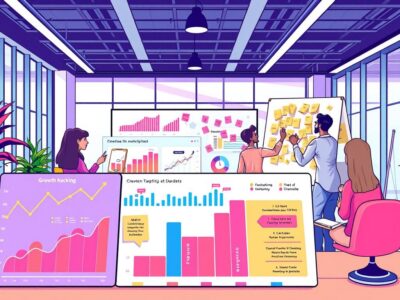AI-powered market segmentation is changing how we target audiences today. It lets businesses understand their customers’ deep behaviors and likes. With AI tools, organizations can look deeply into big data to find patterns that help in creating focused marketing plans.
This approach improves upon old ways of studying audiences, allowing for sharper segmentation. This means brands can truly connect with the right groups of customers. Thus, businesses get to use their marketing resources better and see higher returns on investment (ROI).
For more details, check out this insightful resource that discusses AI’s role in segmentation further.
Key Takeaways
- AI enhances the effectiveness of market segmentation by analyzing large datasets.
- Artificial intelligence segmentation tools facilitate precise audience targeting.
- Data-driven segmentation solutions yield actionable insights for marketing strategies.
- Implementing AI can significantly optimize resource allocation.
- AI-powered segmentation maximizes return on investment (ROI) for businesses.
Introduction to AI-Powered Market Segmentation
AI-powered market segmentation is changing how businesses understand their customers. It uses advanced algorithms and machine learning. This makes it easier for companies to group customers based on their actions and traits. Knowing this helps companies make their marketing strategies more personal.
Definition and Importance
AI market segmentation divides customers into smaller groups with similar characteristics. This is crucial in a competitive world. It lets companies send personalized messages that strike a chord with their audience. This approach is vital for meeting customer needs and boosting engagement.
Key Components of Market Segmentation
Successful market segmentation includes several elements. Demographics talk about age and income, while behaviors look at buying habits. Psychographics delve into what motivates consumers. AI helps analyze these parts, giving a full picture of your market.
The Role of AI in Market Analysis
AI has transformed market analysis. It automates data sorting and makes segmentation quicker and more accurate. AI helps find patterns in large data sets that humans might miss. For more on AI benefits in marketing, read this comprehensive guide.
Benefits of AI in Market Segmentation
AI brings major perks to market segmentation, making marketing efforts stronger. It offers affordable ways to better pinpoint the right folks, making sure messages hit home more effectively. This means brands can engage their audience better and boost interactions.
Increased Accuracy in Targeting
Being precise is key in nailing marketing. AI lets companies sift through tons of data swiftly, spotting trends that might skip the human eye. This leads to more personalized campaigns that hit the mark, enhancing how people react.
Cost-Effectiveness and Efficiency
AI cuts costs significantly. It provides cheaper methods for companies to get the most from their marketing dollars. By saving on manual data work, there’s more room for creating standout campaigns, making operations smoother.
Real-Time Data Analysis
Being able to analyze data instantly changes the game for businesses. AI tools give immediate insights into what consumers want, allowing firms to adapt fast and stay ahead. This quick shift not only boosts customer interaction but also sharpens decision-making all around.

Types of Market Segmentation Enhanced by AI
AI technology is changing the game of market segmentation with its smart algorithms. These tools sift through huge datasets. This lets businesses segment their markets in more clever ways. Thanks to AI, marketing strategies have become much more accurate.
Demographic Segmentation
This type of segmentation looks at age, gender, income, and education to group people. Advanced algorithms help companies create ads that really speak to these groups. This way, companies get a better picture of who their customers are.
Behavioral Segmentation
Behavioral segmentation looks at how customers act and what they buy. AI takes this further by analyzing customer data in real-time. This helps businesses target customers more precisely, based on things like what they buy and their loyalty to the brand.
Psychographic Segmentation
Psychographic segmentation gets into what customers value and enjoy. AI uses algorithms to understand these deeper motivations. This lets brands connect with customers more personally, which can drive up engagement.
Geographic Segmentation
This strategy uses where people live to shape marketing plans. AI crunches location data quickly, helping target areas based on local preferences. Marketing becomes more relevant and effective this way.
Tools and Technologies for AI Market Segmentation
Businesses need to use advanced tools and technologies for AI-powered market segmentation. Choosing the right AI software improves segmentation accuracy and efficiency dramatically. With many powerful options available, companies ensure their marketing is data-driven and targeted.
Popular AI Software
Some AI segmentation software solutions are famous for making the segmentation process easier. Tools like Delve.AI, Salesforce Einstein, and HubSpot Analytics have great features. They automate data analysis and provide real-time insights. By using these platforms, businesses can precisely segment their audience, making their marketing more effective.
Data Collection Tools
Good data collection tools are key for gathering information needed for accurate segmentation. Platforms like Google Analytics, Qualtrics, and SurveyMonkey help gather comprehensive data. They allow organizations to collect insights about their customers. The success of segmentation strategies depends on the quality and accuracy of this data, making these tools very important in marketing technology.
Integration with CRM Systems
Integrating AI with marketing tech, especially CRM systems, is vital for smooth information flow. By linking AI software with CRMs like Salesforce and Zoho, businesses enhance personalization and customer interactions. This integration helps companies use data insights to better tailor their outreach, focusing on specific customer behaviors and preferences.
Implementing AI-Powered Market Segmentation
Using machine learning for market segmentation is key for businesses looking to improve their marketing. To do this right, there are specific steps to follow. These ensure technology works well with your business goals.
Steps to Adopt AI Solutions
First, companies should figure out their goals and who they want to target. It’s important to look at the AI technology available. Then, pick the tools that fit their needs the best. After choosing, training staff on these AI solutions is a must to fully benefit from them.
Best Practices for Effective Segmentation
For good segmentation, focus on keeping your data clean and accurate. This makes sure your results are solid. Keeping an eye on your strategies over time lets you tweak them as needed. Plus, getting insights from other departments can make your strategies even better. This helps understand what customers need more clearly.
Case Studies of Successful Implementations
Many organizations have shown how well machine learning works for market segmentation. For example, some retail brands have used AI to understand what customers buy. This has helped them target customers better and sell more. These success stories show how facing early challenges can end up in achieving great results in the long run.
Challenges in AI-Powered Market Segmentation
AI helps a lot with market segmentation, but there are still big challenges. One main issue is data privacy. Businesses have to be careful with customer information. They need to use AI ethically and follow laws to protect customer data.
Data Privacy Concerns
When businesses use AI for market segmentation, they face strict data privacy laws. Protecting customer info builds trust and strengthens their reputation. Not handling data privacy right could lead to legal problems and make customers leave.
Quality of Data
For AI in market segmentation to work, the data must be good. Quality data leads to correct and useful insights. Bad data can trick companies into making wrong choices. So, it’s crucial to clean and check data carefully.
Over-Reliance on Technology
AI is super useful but depending too much on it can be a mistake. It’s important not to forget about the human touch. Mixing AI’s insights with people’s creativity gets the best results. This balance connects well with customers.

Future Trends in AI Market Segmentation
The way AI is changing market segmentation keeps growing. Companies now see how predictive analytics can foresee what customers will do next. This helps businesses make personalized marketing plans and stay one step ahead in the race.
Predictive Analytics
Predictive analytics is shifting how brands figure out what people want. It lets them use past data to guess future needs, making campaigns more spot-on. This approach cuts down on guesswork and helps use resources better.
Personalization at Scale
Thanks to machine learning, now we can offer unique experiences to each user. This makes customers happier and more loyal. AI helps make sure our messages hit the right note with everyone.
Evolving Consumer Behavior Insights
Understanding changing customer likes is key to better market segmentation. Companies that keep up with these shifts can use their marketing money more wisely. They connect with people more deeply, staying relevant in a quick-moving world.
Conclusion: The Future of Marketing with AI
AI-powered market segmentation is changing the game. It gives marketers top-notch tools to get deeper insights and improve targeting. The perks include more accuracy, better efficiency, and a deeper understanding of what consumers want. We see that the future of marketing counts a lot on these AI tools.
This lets businesses target very precisely and connect with people in a meaningful way.
Summary of Key Insights
Using AI in marketing brings many benefits. It helps understand consumer profiles better and makes campaign processes smoother. As the marketing world changes, adopting AI strategies is key for businesses to stay competitive.
Call to Action for Businesses
Companies should start using AI in their marketing now. By using these new techs, brands can stay on top of trends. This step is crucial to build strong relationships with customers and make the most of marketing based on data.
The Importance of Staying Ahead in Market Trends
The market changes fast, so being adaptable is very important. Companies need to keep revising their strategies to keep up with AI progress. Staying agile and meeting what consumers expect is vital for marketing success. Brands must use AI in their main strategies.
FAQ
What is AI-powered market segmentation?
AI-powered market segmentation sorts customers into groups based on what they have in common. This lets companies understand what customers want and need. It makes it easier to reach the right people.
How does AI improve targeting accuracy in marketing?
AI looks at lots of data to find patterns and what customers like. This helps companies focus their marketing better. So, they can engage people more effectively and see better results.
What are some popular AI software tools for market segmentation?
Tools like Delve.AI use AI to analyze data and give useful insights quickly. They make knowing your audience easier and improve marketing plans.
What are the different types of market segmentation enhanced by AI?
AI helps with many segmentation types. For example, it sorts people by age and income with demographic segmentation. It looks at buying habits with behavioral segmentation. AI also explores personal values with psychographic segmentation and where people live with geographic segmentation.
What steps should businesses take to implement AI-powered market segmentation?
First, businesses should decide what their goals are and who they want to reach. Then, they need to find the right AI tools. It’s crucial to use good data for the best results.
What challenges do organizations face with AI-powered segmentation?
Challenges include keeping data private, ensuring data quality, and not forgetting basic marketing rules. Balancing technology and marketing skills is key.
How can predictive analytics benefit market segmentation?
Predictive analytics helps guess future customer actions. This lets companies plan ahead in their marketing. They can stay ahead of changing market trends.
Why is personalization at scale important in marketing?
Personalization at scale means offering custom experiences to each customer efficiently. AI helps do this by analyzing data automatically. This approach keeps customers happy without extra work.



